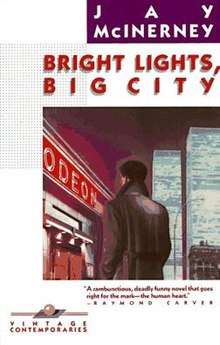Bright Lights, Big City (novel)
Bright Lights, Big City is an American novel by Jay McInerney, published by Vintage Books on August 12, 1984. It is written about a character's time spent caught up in, and notably escaping from, the mid-1980s New York City fast lane.
 First edition cover | |
| Author | Jay McInerney |
|---|---|
| Country | United States |
| Language | English |
| Publisher | Vintage Books |
Publication date | August 12, 1984 |
| Media type | Print (hardback & paperback) |
The novel got its title from the Jimmy Reed blues song of the same name. The novel is written in the second person, an unusual narrative method in English language fiction.
Plot
The story's narrator is a 24-year-old writer who works as a fact checker for a highbrow magazine for which he had once hoped to write. By night, he is a cocaine-using party-goer seeking to lose himself in the hedonism of the 1980s yuppie party scene, often going to a nightclub called Heartbreak.[1]
His wife, Amanda, recently left him, and he copes with this by pretending nothing happened and telling no one that she is gone. The two had met in Kansas City; the narrator moves with her to New York City, where she begins a modeling career that quickly takes off. After flying out to Paris for Fashion Week, she calls the narrator to inform him that she is leaving him for another man and to pursue her career. Initially hopeful that she will return someday, the narrator eventually resorts to searching for her at a fashion event, publicly humiliating himself while failing to garner more attention from her than a brief look. He obsesses over every item she owned in his apartment, every modeling photo and every club she visited, even repeatedly visiting a mannequin based on her. His partying and his personal troubles begin to affect his work. He eventually comes to realize Amanda's superficiality, becoming both disillusioned with her and the materialistic culture of New York in general. He reveals that the true reason for his spiral downwards was his mother's death, which actually took place a year ago. He realizes that he had married Amanda because he thought it would make his mother happy. After his mother's death, he was in shock and it wasn't until Amanda left him that he began really grieving over his mother, causing his cocaine addiction and reckless abandon.
Adaptations
The novel went on to be the source material for the 1988 film Bright Lights, Big City, which was also written by McInerney. In 1999, an off Broadway stage musical was produced by the New York Theater Workshop, written by Paul Scott Goodman and directed by Michael Greif, with orchestrations and musical direction by Richard Barone.[2]
References
- Kornbluth, Jesse: "Inside Area: The Wizardry of New York's Hottest Club", New York Magazine, pg 35, March 11, 1985.
- New York Times article about the musical
Further reading
- Clark, Robert C. (2015). "Popular Minimalism : Jay McInerney's Bright Lights, Big City". American Literary Minimalism. University of Alabama Press. pp. 69–87.
- Girard, Stephanie (1996). "'Standing At The Corner Of Walk And Don't Walk': Vintage Contemporaries, Bright Lights, Big City, and the Problems of betweenness". American Literature. 68 (1): 161–185. JSTOR 2927545.